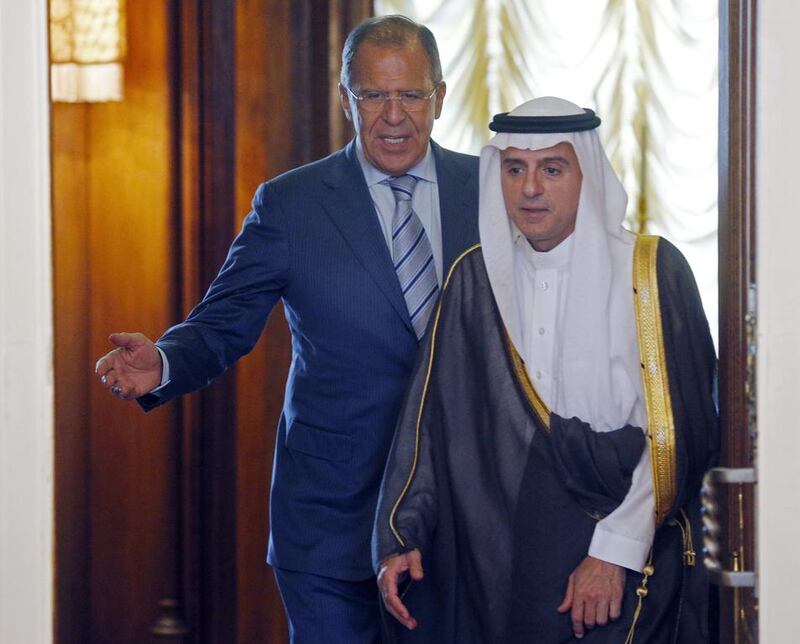ABU DHABI // Saudi Arabia’s foreign minister made clear that his country’s position on Syrian president Bashar Al Assad remained unchanged on Tuesday during a visit to Russia, a key backer of Damascus.
“We believe the question of Bashar Al Assad has been solved. There is no place in Syria for Bashar Al Assad,” Adel Al Jubeir said, following a meeting with his Russian counterpart Sergei Lavrov in Moscow.
Saudi Arabia and Russia have stepped up diplomatic contacts in recent months, amid a renewed push to find a solution to the conflict in Syria, and also as Riyadh aims to increase its profile as a regional leader.
Russia supports Mr Al Assad’s regime, while Saudi Arabia has backed some of the rebel groups seeking to end his family’s decades-long rule.
Yet, four years of bloody civil war in Syria has not resulted in a victory for either side and offered space for extremist groups including ISIL and Al Qaeda-affiliated Jabhat Al Nusra to flourish. The war also offered Iran, Saudi Arabia’s main rival, an opportunity to expand its influence across the region.
Mustafa Alani, a security analyst with close ties to Riyadh, said Saudi Arabia’s King Salman, who ascended to the throne in January, was intent on scaling back Iran’s role in Arab countries, including Syria, and that improving relations with Russia was part of that effort.
“They felt the seat of the Arab leadership has been vacant for too long,” Mr Alani said.
“If you talk to people close to the king in Riyadh, they will tell you King Salman believes that Iran’s expansionist policy is because of the weakness of the Arabs. The Iranians are taking advantage of there being no leadership [among Arabs] or challenge to their role in the region.”
In another sign of Riyadh’s focus on countering Iran, in March a Saudi Arabia-led coalition launched a bombing campaign in Yemen to push back Iranian-backed Houthi rebels who had overthrown the internationally recognised government.
Mr Alani said that years of poor relations between Riyadh and Moscow, which date back to Riyadh’s backing of anti-Soviet mujaheddin groups in Afghanistan during the 1980s, had pushed “the Russians into the camp of the Iranians and Syria”.
“Nothing is going to change if you don’t re-engage to try to solve the problem,” he added, commenting on recent efforts over Syria.
“In Syria ... there is no winner, there is no loser. A stalemate could drag on forever.”
The meeting between Mr Al Jubeir and Mr Lavrov followed a flurry of diplomatic activity. In June, Saudi Arabia’s Deputy Crown Prince and Defence Minister Mohammed bin Salman visited Russia for talks with president Vladimir Putin. On July 14, Iran and world powers signed a deal over Tehran’s controversial nuclear programme that will see the lifting of international sanctions. And last week, Mr Al Jubeir met Mr Lavrov and US secretary of state John Kerry in Doha to discuss Syria. Syrian foreign minister Walid Al Moallem also visited Tehran, before travelling to Muscat to meet Omani officials, who have played a successful mediator role in previous regional conflicts.
Following talks with Mr Al Jubeir on Tuesday, Mr Lavrov described a Russian idea aimed at uniting various actors against ISIL.
The idea would bring together the Syrian and Iraqi armies, along with moderate rebel groups and Kurdish militias, in a coordinated effort to defeat the extremist group, which all sides have recognised as the primary threat emanating from the conflict.
“We need to unite all the groups on the ground,” Mr Lavrov said.
“There’s the coalition led by the US but the air raids will not help to fight and prevail over ISIS.”
A US-led coalition that includes Saudi Arabia and the UAE has bombed ISIL targets in northern Syria and Iraq for a year without dislodging the group from its main strongholds.
Yury Barmin, a Moscow-based analyst focused on the Middle East, said that Russia has become more “flexible” on Syria.
He said Moscow agreed that “Assad should leave, yet it’s not clear when”.
“I believe that Russia will not accept his immediate resignation – for them some transitional period is preferable. That way a joint operation against ISIS could be launched and Assad would be guaranteed a safe exit.”
Mr Al Jubeir said Riyadh would not join a coalition where the Syrian and Saudi Arabian armies worked together. But “as for fighting extremism and terrorism, I believe we have an identical approach as Russia,” he said.
The main difference was that Saudi Arabia sees Mr Al Assad as “part of the problem and not part of the solution to the Syrian crisis”, he added.
Asked whether Saudi Arabia was expanding its military cooperation with Russia, Mr Al Jubeir said that Riyadh wanted to step up cooperation with Russia in all areas, including the defence sector.
Russia’s Iskander Tactical Ballistic Missile System is a piece of military hardware that Saudi Arabia is considering purchasing, he said.
Mr Alani said Saudi Arabia wanted “to send a clear message that they have no problem dealing with Russian arms or buying Russian arms”.
However, Mr Barmin said cooperation in this area could depend on how discussions on Syria play out.
“Saudi Arabia is continuously ranked among the top five countries by military expenditure and naturally Russian defence companies would like to do business with Riyadh,” he said.
“But I believe that until they reach an agreement on the Syrian crisis there could be no major arms deals between the two.”
jvela@thenational.ae





